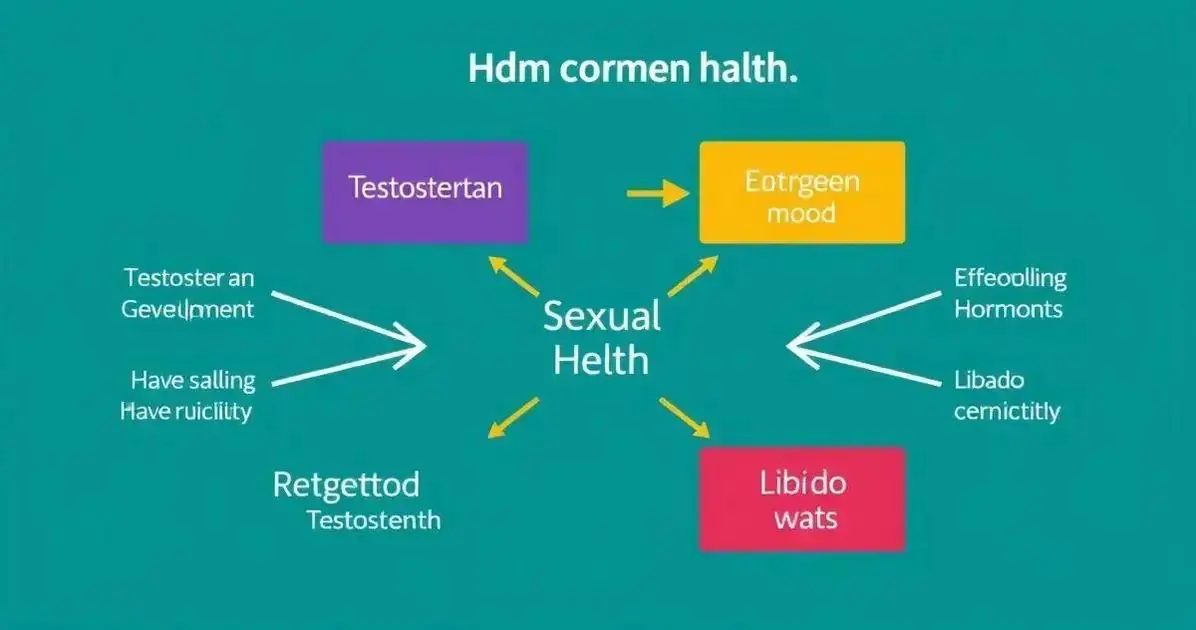To balance hormones for optimal sexual health, focus on a nutritious diet rich in leafy greens, fatty fish, and nuts, engage in regular exercise, practice stress management techniques like meditation and journaling, and recognize when to seek professional help for persistent symptoms.
Balancing hormones is essential for optimal sexual health. By understanding how hormones affect your body and mood, you can take steps to improve your overall wellness. In this blog post, we will explore key factors that influence hormone levels, including diet, exercise, stress management, and more. With the right strategies, you can enjoy a healthier and more satisfying sexual life.
Understanding Hormones and Sexual Health

Hormones are chemical messengers in our body that play a crucial role in regulating various functions, including sexual health. They affect your mood, energy levels, and, importantly, your libido. To maintain optimal sexual health, it’s essential to understand how these hormones operate and interact with other bodily systems.
Key Hormones Involved
Several hormones are particularly influential in sexual health:
- Testosterone: Often associated with male sexual health, testosterone also plays a significant role in female libido. Low levels can lead to reduced sexual desire.
- Estrogen: This hormone is vital for female sexual health and influences mood, arousal, and lubrication. A drop in estrogen levels can occur during menopause, affecting sexual function.
- Progesterone: Essential for regulating the menstrual cycle, progesterone also impacts sexual desire. Imbalances can lead to various sexual health issues.
The Impact of Hormonal Imbalance
When hormone levels are out of balance, various issues may arise. Women may experience vaginal dryness, discomfort during intercourse, or a decrease in sexual desire. Men may find they have lower energy levels or difficulty achieving an erection. These symptoms can significantly affect one’s overall sexual health and relationship satisfaction.
Signs You Might Have Hormonal Issues
It’s important to recognize the signs of hormonal issues:
- Unexplained mood swings
- Fatigue even after enough sleep
- Changes in libido
- Difficulty concentrating
If any of these symptoms resonate with you, it may be beneficial to consult with a healthcare professional.
Top Foods to Balance Hormones

Eating the right foods can significantly impact your hormone balance. Certain nutrients help support hormone production and regulation, enhancing your sexual health. Here are some top foods to consider:
1. Leafy Greens
Vegetables like spinach, kale, and Swiss chard are high in magnesium, a mineral that supports testosterone and estrogen production. Including cooked or raw leafy greens in your diet can improve hormone function.
2. Fatty Fish
Fish like salmon, sardines, and mackerel are rich in omega-3 fatty acids. These healthy fats help to combat inflammation and support insulin sensitivity, which are both essential for hormonal balance.
3. Avocados
This creamy fruit is packed with healthy fats, fiber, and vitamins. Avocados can improve hormone production and regulate estrogen levels, making them beneficial for both men and women.
4. Nuts and Seeds
Almonds, walnuts, flaxseeds, and pumpkin seeds are excellent sources of healthy fats and essential nutrients. These foods help reduce stress hormones and support the production of sex hormones.
5. Cruciferous Vegetables
Broccoli, cauliflower, and Brussels sprouts contain compounds that aid in estrogen metabolism. They help the body eliminate excess estrogen, promoting hormonal balance.
Integrating these foods into your daily meals can enhance your hormone health and, by extension, your sexual wellness. Aim for a balanced diet that includes a variety of these nutrient-dense options.
Exercise and Its Role in Hormonal Balance

Regular exercise plays a significant role in maintaining hormonal balance, which is crucial for optimal sexual health. Engaging in physical activity can influence several hormones in the body positively.
Boosting Testosterone Levels
Strength training and high-intensity interval training (HIIT) may increase testosterone levels. Testosterone is vital for both men and women as it boosts libido and overall energy. Aim for at least 30 minutes of strength training two to three times a week to help elevate your testosterone.
Regulating Insulin
Exercise helps improve insulin sensitivity, which is essential for managing blood sugar levels. Balanced insulin levels can reduce fatigue and increase energy, positively affecting mood and libido. Activities like walking, jogging, or cycling can have a tremendous impact on insulin regulation.
Enhancing Endorphin Production
Physical activity triggers the release of endorphins, the body’s natural mood lifters. These endorphins can reduce stress levels, which is important because high stress can lead to hormonal imbalances. Consider incorporating exercises such as yoga or dance that promote both movement and relaxation.
Managing Cortisol Levels
While short bursts of stress can be beneficial, prolonged stress leads to elevated levels of cortisol. High cortisol can negatively impact your sexual health. Regular exercise helps lower cortisol levels, promoting a healthier hormonal environment.
Create a Consistent Routine
To reap the benefits of exercise on hormonal balance, consistency is key. Aim for a mix of aerobic exercises, strength training, and flexibility workouts. Establishing a routine can help you stay committed and promote long-term hormonal health.
Stress Management Techniques

Managing stress is essential for maintaining hormonal balance, especially when it comes to sexual health. High stress levels can elevate cortisol, disrupting other hormones. Here are some effective stress management techniques you can practice:
1. Mindfulness and Meditation
Practicing mindfulness can help you focus on the present moment and reduce anxiety. Meditation techniques, including deep breathing exercises, can calm your mind, lowering stress and cortisol levels. Aim for a few minutes of meditation each day.
2. Regular Physical Activity
As mentioned earlier, exercise helps reduce stress hormones and elevate mood. Engage in activities you enjoy, such as dancing, hiking, or swimming, for at least 30 minutes a day. This routine can significantly decrease stress levels and improve overall hormonal health.
3. Adequate Sleep Quality
Getting enough quality sleep is vital for stress management. Create a bedtime routine that promotes relaxation. Aim for 7-9 hours of sleep per night. A consistent sleep schedule can help regulate hormone levels.
4. Journaling
Writing down your thoughts and feelings can serve as an emotional outlet. Journaling can help clear your mind and provide perspective on stressors. It can also improve self-awareness and help identify triggers.
5. Social Connections
Spending time with friends and family can serve as a powerful stress reliever. Positive social interactions can elevate mood and boost emotional well-being, which is essential for hormone regulation. Make time for enjoyable social activities.
By incorporating these stress management techniques into your daily life, you can support hormonal balance and improve your sexual health.
When to Seek Professional Help

Knowing when to seek professional help is crucial for managing hormonal imbalances and supporting sexual health. Here are some signs to watch for:
Persistent Mood Changes
If you experience ongoing mood swings, anxiety, or depression that disrupt your daily life, it’s important to consult a healthcare professional. Hormonal imbalances can significantly affect mental health.
Low Libido
A noticeable decline in sexual desire that lasts for an extended period can indicate a hormonal issue. If you find this affects your relationships, talking to a provider may be necessary.
Significant Fatigue
Feeling constantly tired, even after adequate sleep, may signal a hormonal imbalance, such as low testosterone or thyroid issues. Getting an evaluation can help identify the cause.
Irregular Menstrual Cycles
For women, irregular or missed periods can signify hormonal disruption. If you experience significant changes in your cycle, it’s wise to seek guidance from a healthcare professional.
Physical Symptoms
Unexplained weight gain or loss, hair loss, and skin changes may also be signs of hormonal imbalances. If you notice these symptoms, consider scheduling an appointment with a doctor.
Recognizing these signs early can lead to better management of hormonal health and improve overall well-being.
In Summary: Achieving Hormonal Balance for Enhanced Sexual Health
Understanding how to balance hormones is crucial for optimal sexual health. By incorporating healthy foods, consistent exercise, effective stress management techniques, and knowing when to seek professional help, you can enhance your overall well-being.
Monitoring your symptoms and making lifestyle changes can significantly impact hormone levels, leading to increased energy, improved mood, and a satisfying sex life. Prioritizing your hormonal health is essential for achieving a balanced and fulfilling life.
Taking these steps today can pave the way for a healthier future, so start your journey toward hormonal balance and improved sexual health now.
FAQ – Frequently Asked Questions about Balancing Hormones for Optimal Sexual Health
What are the signs of hormonal imbalance?
Common signs include persistent mood changes, low libido, significant fatigue, irregular menstrual cycles, and physical symptoms like weight changes.
How can diet impact my hormone levels?
Eating the right foods, such as leafy greens, fatty fish, and nuts, can support hormonal balance and promote better sexual health.
What types of exercise are best for hormonal balance?
A mix of strength training, aerobic activities, and flexibility exercises can help regulate hormones and improve overall well-being.
How does stress affect hormones?
High levels of stress can lead to increased cortisol production, disrupting other hormones and negatively impacting sexual health.
When should I seek professional help for hormone issues?
If you experience persistent mood changes, low libido, notable fatigue, or physical symptoms such as weight fluctuations, it’s important to consult a healthcare professional.
Can lifestyle changes really improve hormonal health?
Yes, adopting a healthier diet, regular exercise, effective stress management, and adequate sleep can significantly enhance hormonal balance and sexual health.













